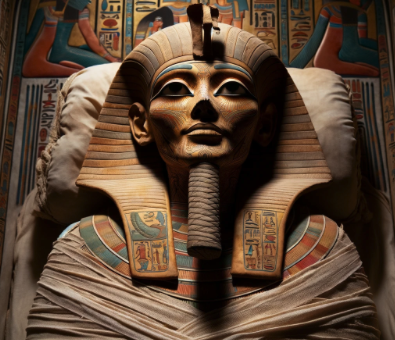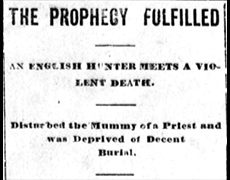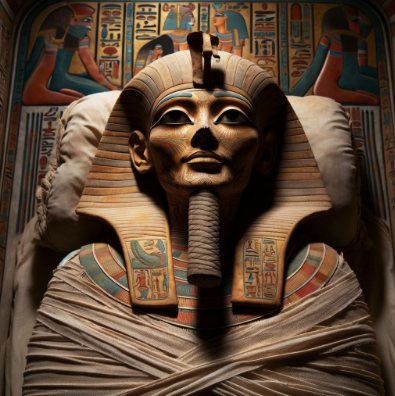
Some say Ingram died because of the mummy’s curse. I say he shouldn’t have been slaughtering elephants.
Read on and decide for yourself.
The Prophesy Fulfilled

As a kind of souvenir of his adventures in Egypt and the Sudan, Mr. Ingram bought a mummy for £50 from the English Consul at Luxor.
The mummy was that of a priest of Thetis, and it bore a mysterious inscription.
After obtaining, at Cairo, the necessary permits, Ingram sent the mummy home in a big case, which was opened by his brothers.
Over the face was a papier mache mask, which is now deposited in the British Museum.
The last-named institution was asked to send along an expert to decipher and translate the inscription, which was long and blood-curdling.
It set forth that whosoever disturbed the body of this priest should himself be deprived of decent burial; he would meet with a violent death, and his mangled remains would be “carried down by a rush of water to the sea.”

This is the first part of a fascinating romance of real life. Some time after sending the mummy home, Mr. Ingram and Sir Henry Meux were elephant shooting in Somaliland, when one day the natives brought in a great chunk of dried earth, saying it was the spoor of the biggest elephant in the world.
The temptation was too much for the two sportsmen, so they hunted up that herd.
“I’ve left my elephant gun behind,” cried Sir Henry, in dismay.
“Take mine,” said Ingram, generously, leaving himself with a comparatively impotent small bore.
When they sighted the elephants, Sir Henry went after a bull and Mr. Ingram turned his attention to an enormous cow.
His method was to turn round in his saddle, fire a shot and then gallop his pony on ahead, dodging the infuriated elephant among the trees.
At least, looking back for another shot, he was swept out of his saddle by the drooping bough of a tree.

The moment he reached the ground the wounded elephant was upon him, goring and trampling him to death, notwithstanding the heroism of his Somali servant, who poured a charge of shot right into the monster’s ear.
For days the elephant would not let anyone approach the spot, but eventually Mr. Ingram’s remains were reverently gathered up and buried for the time being in a nullah or ravine.
Never again was the body seen, for when an expedition was afterward dispatched to the spot only one sock and part of a human bone were found; these pitiful relics were subsequently interred at Aden with military honors.
It was found that the floods caused by heavy rains had washed away Mr. Ingram’s remains, thereby fulfilling the ancient prophesy — the awful threat of the priest of Thetis.
Source: Evening bulletin. [volume] (Honolulu [Oahu, Hawaii]), 21 Oct. 1896.

